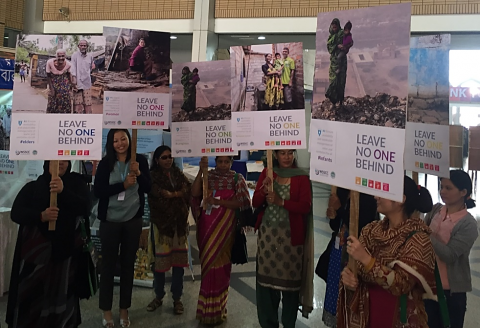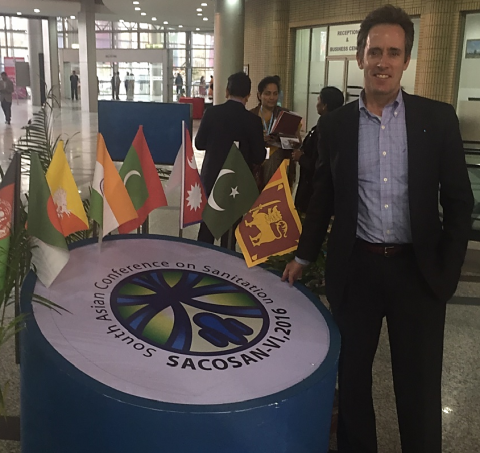John Oldfield blogs about his thoughts on the recent SACOSAN conference and the implications for the future. Original posted on the Sanitation and Water for All Partnership website.
Read and download the full SACOSAN VI Declaration. Governments, keep your promises: 100% is possible!
On stage at the Bangabandhu International Conference Center in Dhaka, Bangladesh on January 13, 2016 were villagers with physical disabilities, adolescent girls, transgender leaders, sanitation workers, landless farmers, housewives, and students from across South Asia. Their voices at SACOSAN VI were clear: we all deserve access to safe drinking water, sanitation, and hygiene, including handwashing and menstrual hygiene. We are part of the 100%; we are part of the Sustainable Development Goals commitments (SDGs); and we expect our countries to work with us to meet their obligations to us and our fellow citizens.
This inspiring morning was the highlight of SACOSAN VI for me. The event, Leave No One Behind: Voices of Adolescents, Women, Disabled & Elderly People and Sanitation Workers, organized by the Water Supply and Sanitation Collaborative Council reinforced the message that we need to ensure all voices are heard as we progress toward the SDGs. [The lowlights were clearly the unreal congestion, and the lack of visas for the Pakistani delegation, but those stories are for another platform.]

SACOSAN VI also included Beyond Just Toilets: International Conclave on Fast Tracking an Open Defecation Free South Asia (brought to us by the CLTS Foundation), and an underlying but strong current of strengthened political will throughout the region. On that latter note I would highlight in particular the energetic efforts of the Indian delegation to meet Prime Minister Modi’s call for a Clean India (zero open defecation and universal access to sanitation throughout the country) by 2019. India’s Union Minister of Drinking Water and Sanitation, Birender Singh, the head of the Indian delegation, amplified that message in his remarks, stating “India is acutely aware of the impact of India’s sanitation status on the overall progress of sanitation in the region and the world. Brothers and sisters, I assure you, that India will not be found wanting on any of the parameters of sanitation.”
The progress made – and importance of monitoring such progress – since the first SACOSAN in 2003 was also a recurring theme throughout the event, and the most recent traffic light report from WaterAid and others was well received. Of great interest was the fact that host country Bangladesh has almost completely eliminated open defecation, and many in the region are looking to learn from Bangladesh’s success on this front.
It was clear in Dhaka that civil society organisations in the region are stronger, their dialogues with government are more fruitful (but need to be strengthened), and the linkages between WASH and health, economic development, education, and gender equity are better understood and reflected in policy and practise.
The final Declaration from SACOSAN VI included much strong language, including a commitment to ”Prioritize the poorest and most marginalized, bridging the gaps in access to and use of appropriate sanitation and hygiene services for children, adolescents, women, differently-abled people, or those excluded due to age, caste, ethnicity, religion or gender, living in hard to reach areas or affected by disasters.” 100% coverage means coverage for 100%, and I and many others (Sanitation and Water for All, WSSCC, WASHwatch.org, GLAAS, JMP, and so on) will be working on WASH policies and programmes in SACOSAN countries to see that they live up to that commitment and have strong progress to report about “all voices being heard” by SACOSAN VII in Pakistan.

John Oldfield, CEO of WASH Advocates from 2011-2015, is now launching Friends of Clean India to support Prime Minister Modi’s commitment to universal coverage of sanitation in India by October 2, 2019, Mahatma Gandhi’s 150th birthday.